| Article ID | Journal | Published Year | Pages | File Type |
|---|---|---|---|---|
| 872086 | Journal of Biomechanics | 2013 | 7 Pages |
Implanted cartilage replacements (ICRs) are a promising approach to restore the functionality of joints with partial- and full-thickness articular cartilage lesions. Two major hurdles hindering successful repair of cartilage injuries with ICRs are their inadequate mechanical properties and fixation into the defect area. While the ICR geometry and mechanical properties are expected to affect the loads and deformations at the adhesive interface between the implant and native cartilage, little is known about the relationship between these implant characteristics and the quality of the fixation. The objective of this study was to evaluate the effect of implant size, thickness, modulus, surface coefficient of friction and Poisson's ratio on the failure of a fibrin adhesive interface. These factors were evaluated in an idealized finite element model of the medial compartment of the human knee with the damage and failure of fibrin at the implant/cartilage interface represented by a cohesive zone model. Both axial compression and sliding were included in the loading conditions. The results demonstrated that ICR size and material properties have a significant effect on the failure of the fibrin that adheres the implant to the native tissue. Lack of anchorage to underlying bone, larger implant sizes, higher surface coefficient of friction and higher compliance of the implant can increase the chance of implant loosening and delamination. In the future, these results may guide implant design and cartilage repair techniques.
